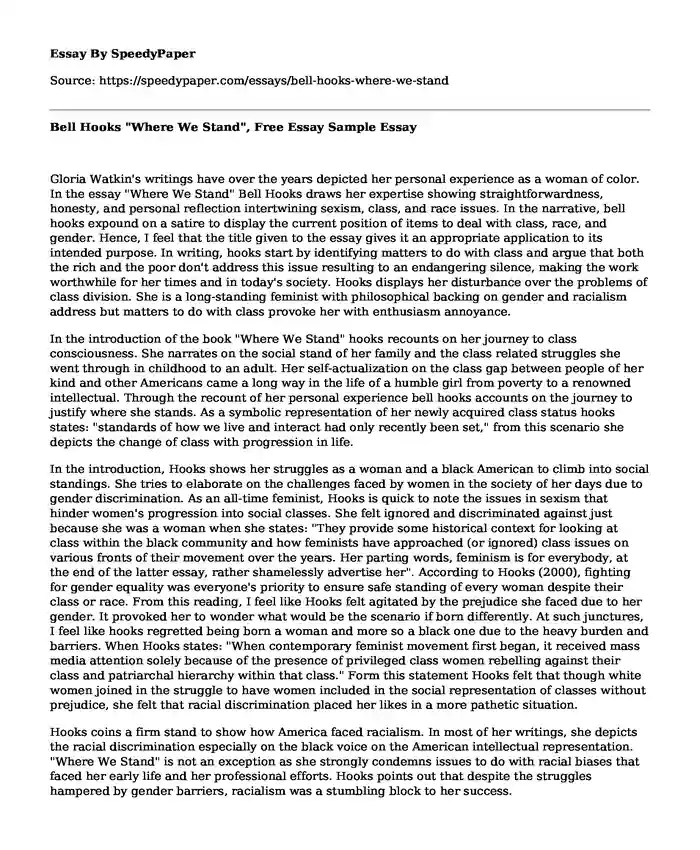
| Type of paper: | Essay |
| Categories: | Race Gender Discrimination |
| Pages: | 3 |
| Wordcount: | 642 words |
Gloria Watkin's writings have over the years depicted her personal experience as a woman of color. In the essay "Where We Stand" Bell Hooks draws her expertise showing straightforwardness, honesty, and personal reflection intertwining sexism, class, and race issues. In the narrative, bell hooks expound on a satire to display the current position of items to deal with class, race, and gender. Hence, I feel that the title given to the essay gives it an appropriate application to its intended purpose. In writing, hooks start by identifying matters to do with class and argue that both the rich and the poor don't address this issue resulting to an endangering silence, making the work worthwhile for her times and in today's society. Hooks displays her disturbance over the problems of class division. She is a long-standing feminist with philosophical backing on gender and racialism address but matters to do with class provoke her with enthusiasm annoyance.
In the introduction of the book "Where We Stand" hooks recounts on her journey to class consciousness. She narrates on the social stand of her family and the class related struggles she went through in childhood to an adult. Her self-actualization on the class gap between people of her kind and other Americans came a long way in the life of a humble girl from poverty to a renowned intellectual. Through the recount of her personal experience bell hooks accounts on the journey to justify where she stands. As a symbolic representation of her newly acquired class status hooks states: "standards of how we live and interact had only recently been set," from this scenario she depicts the change of class with progression in life.
In the introduction, Hooks shows her struggles as a woman and a black American to climb into social standings. She tries to elaborate on the challenges faced by women in the society of her days due to gender discrimination. As an all-time feminist, Hooks is quick to note the issues in sexism that hinder women's progression into social classes. She felt ignored and discriminated against just because she was a woman when she states: "They provide some historical context for looking at class within the black community and how feminists have approached (or ignored) class issues on various fronts of their movement over the years. Her parting words, feminism is for everybody, at the end of the latter essay, rather shamelessly advertise her". According to Hooks (2000), fighting for gender equality was everyone's priority to ensure safe standing of every woman despite their class or race. From this reading, I feel like Hooks felt agitated by the prejudice she faced due to her gender. It provoked her to wonder what would be the scenario if born differently. At such junctures, I feel like hooks regretted being born a woman and more so a black one due to the heavy burden and barriers. When Hooks states: "When contemporary feminist movement first began, it received mass media attention solely because of the presence of privileged class women rebelling against their class and patriarchal hierarchy within that class." Form this statement Hooks felt that though white women joined in the struggle to have women included in the social representation of classes without prejudice, she felt that racial discrimination placed her likes in a more pathetic situation.
Hooks coins a firm stand to show how America faced racialism. In most of her writings, she depicts the racial discrimination especially on the black voice on the American intellectual representation. "Where We Stand" is not an exception as she strongly condemns issues to do with racial biases that faced her early life and her professional efforts. Hooks points out that despite the struggles hampered by gender barriers, racialism was a stumbling block to her success.
Works cited
Hooks, Bell. Where We Stand: Class Matters. New York: Routledge, 2000. Print.
Cite this page
Bell Hooks "Where We Stand", Free Essay Sample. (2022, Apr 06). Retrieved from https://speedypaper.net/essays/bell-hooks-where-we-stand
Request Removal
If you are the original author of this essay and no longer wish to have it published on the SpeedyPaper website, please click below to request its removal:
- 1978 Invasion of the Body Snatchers, Free Essay on Horror Movies
- Essay Example on the Origins of the Cold War
- Free Essay: System Background and Functionality of the New Print-R-Us Automated System
- An Unexpected Christmas Gift - Creative Writing Essay Example
- The Role of Community Health Nursing and Community Partnerships - Essay Sample
- Essay Sample on Bayes' Theorem
- Paper Sample on Exploring Intelligence: IQ, Multiple Intelligences, and Emotional Intelligence in Learning
Popular categories




